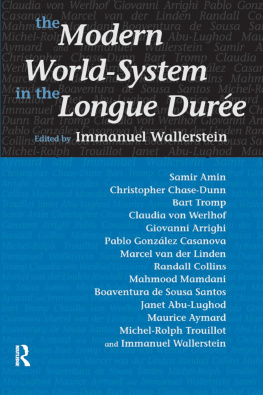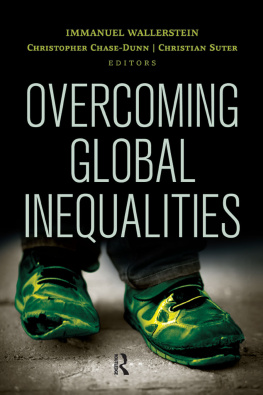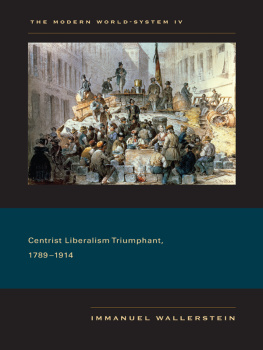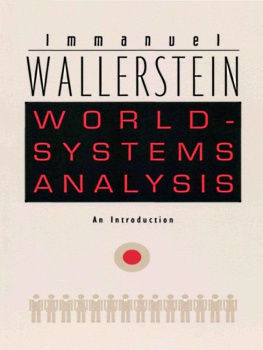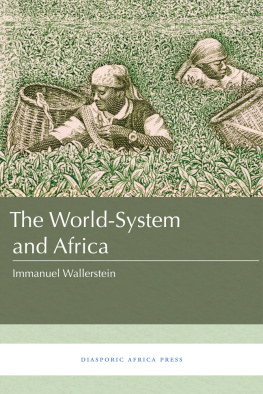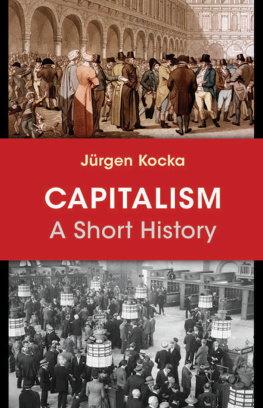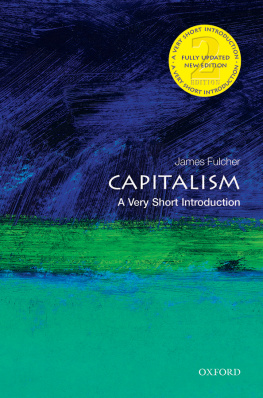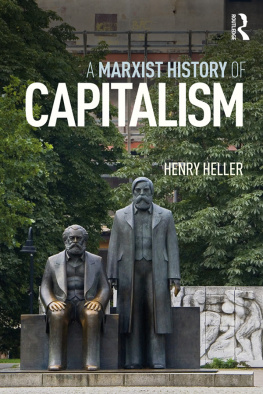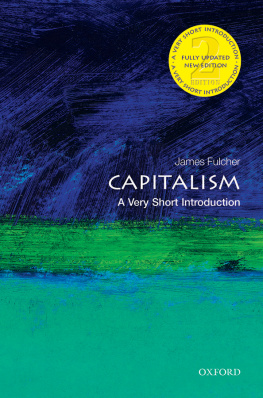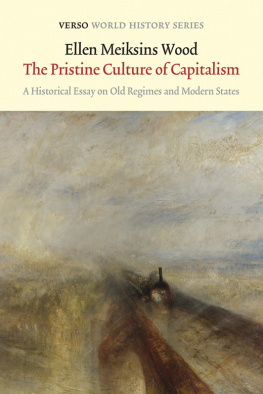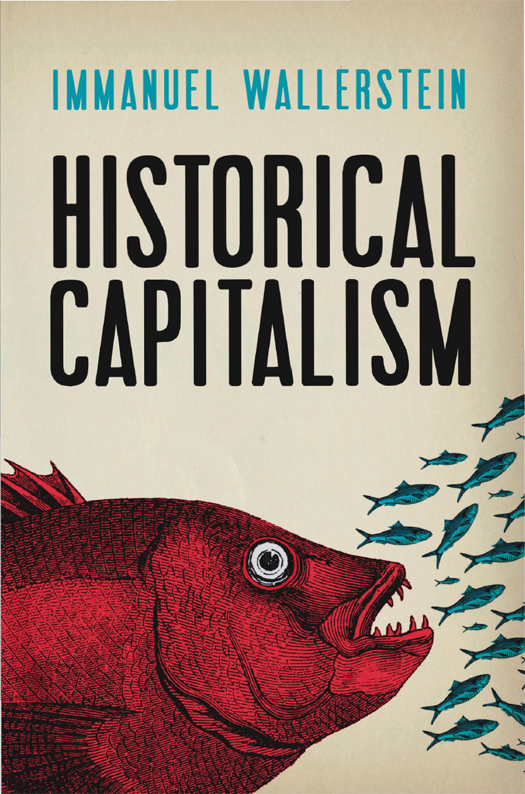IMMANUEL WALLERSTEIN was born in 1930 in New York. He received his BA in 1951 and his doctorate in 1959 from Columbia University, and went on to teach in the universitys sociology department. His primary area of research in the period 19551970 was Africa. In 1961 he published Africa: the Politics of Independence and in 1967 Africa: the Politics of Unity. After active involvement in the reform movement at Columbia in 1968, he took up a post at McGill University in Montreal in 1971. Since 1976 he has been Distinguished Professor of Sociology at Binghamton University, and Director of the Fernand Braudel Center for the Study of Economies, Historical Systems, and Civilizations. In 1994 he was elected President of the International Sociological Association. The multi-volume work, The Modern World-System, has had three volumes published to date (1974, 1980 and 1989).

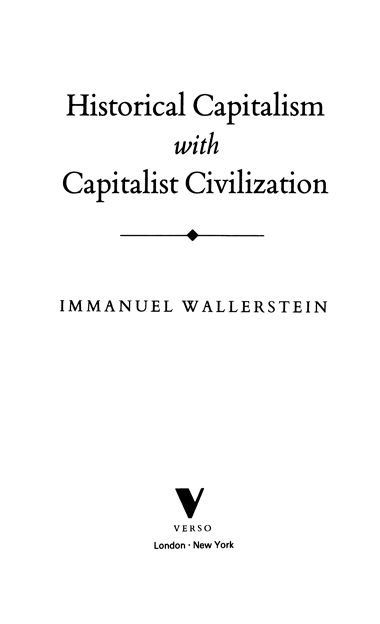
Immanuel Wallerstein 1983
Second Impression 1984
Third Impression 1987
Fourth Impression 1989
Fifth Impression 1992
Sixth Impression 1993
Seventh Impression (new edition incorporating Capitalist Civilization) 1995
Eighth Impression 1996
Ninth Impression 1998
Tenth Impression 1999
Eleventh Impression 2003
Verso
UK: 6 Meard Street, London W1F 0EG
USA: 180 Varick Street, New York NY 100144606
Filmset in Compugraphic Bembo by
Comset Graphic Designs
ISBN-13: 978-1-85984-105-1
eISBN (US): 978-1-84467-835-8
eISBN (UK): 978-1-78168-968-4
v3.1
Contents
The Commodification of Everything:
Production of Capital
The Politics of Accumulation:
Struggle for Benefits
Truth as Opiate:
Rationality and Rationalization
Conclusion:
On Progress and Transitions
HISTORICAL CAPITALISM
Introduction
This book had its immediate origin in two successive requests. In the autumn of 1980, Thierry Paquot invited me to write a short book for a series he was editing in Paris. He suggested as my topic Capitalism. I replied that I was, in principle, willing to do it, but that I wished my topic to be Historical Capitalism.
I felt that much had been written about capitalism by Marxists and others on the political left, but that most of these books suffered from one of two faults. One variety were basically logico-deductive analyses, starting from definitions of what capitalism was thought to be in essence, and then seeing how far it had developed in various places and times. A second variety concentrated on presumed major transformations of the capitalist system as of some recent point in time, in which the whole earlier point of time served as a mythologized foil against which to treat the empirical reality of the present.
What seemed urgent to me, a task to which in a sense the whole corpus of my recent work has been addressed, was to see capitalism as a historical system, over the whole of its history and in concrete unique reality. I, therefore, set myself the task of describing this reality, of delineating precisely what was always changing and what had not changed at all (such that we could denote the entire reality under one name).
I believe, like many others, that this reality is an integrated whole. But many who assert this view argue it in the form of an attack on others for their alleged economism or their cultural idealism or their over-emphasis on political, voluntaristic factors. Such critiques, almost by their nature, tend to fall by rebound into the sin opposite to the one they are attacking. I have therefore tried to present quite straightforwardly the overall integrated reality, treating successively its expression in the economic, political, and cultural-ideological arenas.
Shortly after I agreed in principle to do this book, I received an invitation from the Department of Political Science at the University of Hawaii to give a series of lectures. I seized the opportunity to write this book as those lectures, given in the spring of 1982. The first version of the first three chapters was presented in Hawaii, and I am grateful to my lively audience for their many comments and criticisms which enabled me to improve the presentation considerably.
One improvement I made was to add the fourth chapter. I realized in the course of the lectures that one problem of exposition persisted: the enormous subterranean strength of the faith in inevitable progress. I realized too that this faith vitiated our understanding of the real historical alternatives before us. I, therefore, decided to address the question directly.
Finally, let me say a word about Karl Marx. He was a monumental figure in modern intellectual and political history. He has bequeathed us a great legacy which is conceptually rich and morally inspiring. When he said, however, that he was not a Marxist, we should take him seriously and not shrug this aside as a bon mot.
He knew, as many of his self-proclaimed disciples often do not, that he was a man of the nineteenth century, whose vision was inevitably circumscribed by that social reality. He knew, as many do not, that a theoretical formulation is only understandable and usable in relation to the alternative formulation it is explicitly or implicitly attacking; and that it is entirely irrelevant vis--vis formulations about other problems based on other premisses. He knew, as many do not, that there was a tension in the presentation of his work between the exposition of capitalism as a perfected system (which had never in fact existed historically) and the analysis of the concrete day-to-day reality of the capitalist world.
Let us, therefore, use his writings in the only sensible waythat of a comrade in the struggle who knew as much as he knew.
1.
The Commodification of Everything:
Production of Capital
Capitalism is first and foremost a historical social system. To understand its origins, its workings, or its current prospects, we have to look at its existing reality. We may of course attempt to summarize that reality in a set of abstract statements, but it would be foolish to use such abstractions to judge and classify the reality. I propose therefore instead to try to describe what capitalism has actually been like in practice, how it has functioned as a system, why it has developed in the ways it has, and where it is presently heading.
The word capitalism is derived from capital. It would be legitimate therefore to presume that capital is a key element in capitalism. But what is capital? In one usage, it is merely accumulated wealth. But when used in the context of historical capitalism it has a more specific definition. It is not just the stock of consumable goods, machinery, or authorized claims to material things in the form of money. Capital in historical capitalism does of course continue to refer to those accumulations of the efforts of past labour which have not yet been expended; but if this were all, then all historical systems back to those of Neanderthal man could be said to have been capitalist, since they all had some such accumulated stocks that incarnated past labour.
What distinguishes the historical social system we are calling historical capitalism is that in this historical system capital came to be used (invested) in a very special way. It came to be used with the primary objective or intent of self-expansion. In this system, past accumulations were capital only to the extend they were used to accumulate more of the same. The process was no doubt complex, even sinuous, as we shall see. But it was this relentless and curiously self-regarding goal of the holder of capital, the accumulation of still more capital, and the relations this holder of capital had therefore to establish with other persons in order to achieve this goal, which we denominate as capitalist. To be sure, this object was not exclusive. Other considerations intruded upon the production process. Still, the question is, in case of conflict, which considerations tended to prevail? Whenever, over time, it was the accumulation of capital that regularly took priority over alternative objectives, we are justified in saying that we are observing a capitalist system in operation.


